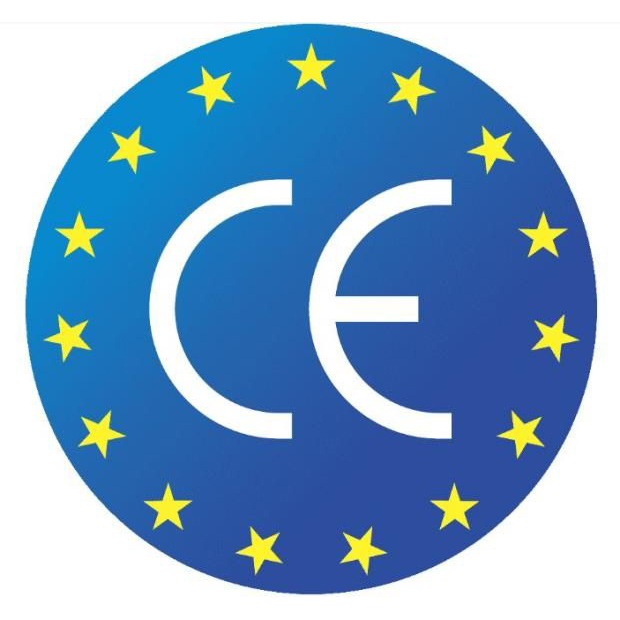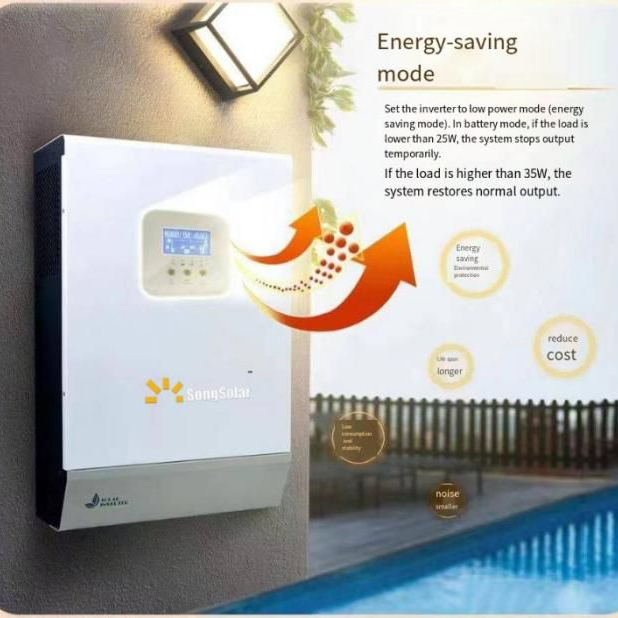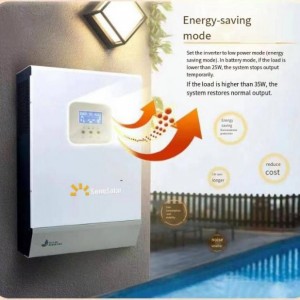1000w,2000w,3000w Off Grid Inverter,(Micro-Inverter)
Short Description:
Products Datasheet
| GA1012P | GA2024P | GA3024ML | GA3024MH | GA5048MH | ||
| Input | Input system | L+N+PE | ||||
| Rated input voltage | 208/220/230/240 | |||||
| Voltage range | 154-264VAC±3V | |||||
| Frequency range | 50Hz/60Hz(自适 | |||||
| Output | Output rated power | 1000W | 2000W | 3000W | 3000W | 5000W |
| Output Voltage | 208/220/230/240 | |||||
| Output rated | 50/60Hz±0.1% | |||||
| Waveform | Output rated power | |||||
| Switch time (optional) | computer equipment10ms | |||||
| peak power | 2000VA | 4000VA | 6000VA | 6000VA | 10000VA | |
| Overload capacity | Battery mode: | |||||
| 1min@102%~110% | ||||||
| Load | ||||||
| 10s@110%~130% | ||||||
| Load | ||||||
| 3s@130%~150% | ||||||
| Peak efficiency (battery mode) | >93% | >93% | >94% | >94% | >94% | |
| Battery | Nominal voltage | 12Vdc | 24Vdc | 24Vdc | 24Vdc | 48Vdc |
| Constant charge voltage (optional) | 14.1Vdc | 28.2Vdc | 28.2Vdc | 28.2Vdc | 56.4Vdc | |
| Floating charging voltage (optional) | 13.5Vdc | 27Vdc | 27Vdc | 27Vdc | 54Vdc | |
| Charger | PV charging mode | PWM | PWM | MPPT | MPPT | MPPT |
| PV Maximum input power | 600W | 1200W | 1500W | 3500W | 5500W | |
| MPPT Tracking range | N/A | N/A | 30~115Vdc | 120~430Vdc | 120~450Vdc | |
| Maximum PV input voltage | 55Vdc | 80Vdc | 145Vdc | 500Vdc | 500VDC | |
| Maximum PV charging current | 50A | 50A | 60A | 60A | 100A | |
| Maximum mains charging current | 50A | 50A | 60A | 60A | 100A | |
| Maximum charging current | 100A | 100A | 100A | 100A | 100A | |
| Show | LCD port | The running mode/can be displayed | ||||
| Port | RS232 | 5PIN/Pitch2.0mm | ||||
CE Certification

Please Use Solar Energy
Solar energy is a clean, renewable and abundant source of energy that has been used for centuries. The sun is a natural nuclear reactor that produces an immense amount of energy, which can be harnessed using solar panels or solar thermal systems.
Solar panels, also known as photovoltaic (PV) systems, convert sunlight into electricity. The panels are made up of photovoltaic cells that absorb sunlight and generate direct current (DC) electricity. The DC electricity is then converted into alternating current (AC) electricity using an inverter, which can be used to power homes, businesses, and even entire communities.
Solar thermal systems, on the other hand, use the heat from the sun to generate steam, which can be used to power turbines and generators. These systems are often used in large-scale power plants to generate electricity for cities and regions.
In addition to its environmental benefits, solar energy also has economic benefits. It creates jobs in manufacturing, installation, and maintenance of solar panels and solar thermal systems. Solar energy also reduces our dependence on fossil fuels, which are finite resources and contribute to climate change.
The cost of solar energy has decreased significantly over the years, making it more affordable for homeowners and businesses. In fact, in some parts of the world, solar energy is now cheaper than coal or gas-generated electricity.
There are several types of solar panels available on the market, including monocry stalline, polycry stalline, and thin-film panels. Each type of panel has its own advantages and disadvantages, depending on the location, climate, and energy needs of the user.
Governments and organizations around the world are investing heavily in solar energy research and development, with the goal of improving its efficiency and affordability. The adoption of solar energy is crucial for a sustainable future, as it offers a clean, reliable, and affordable source of energy.
In conclusion, solar energy is a promising technology that has the potential to transform the way we generate and use electricity. Its many benefits make it an attractive option for homeowners, businesses, and governments alike. With continued investment and innovation, solar energy can play a key role in creating a cleaner, more sustainable future for us all.





